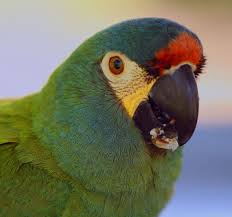Illiger’s Macaw

Description
The Illiger's macaw (Primolius maracana), in aviculture more commonly known as Blue-winged macaw, is a species of macaw found in central and eastern South America. The second name is in honor of the German ornithologist Johann Karl Wilhelm Illiger. It was previously placed in the genus Ara or Propyrrhura. Blue-winged macaws have been known to reach an age of 50–60 years.
It has a total length of approximately 36–43 cm (14–17 in). It has a moderately-sized black bill, a long tail and a mainly green plumage. The upperside of the remiges and primary coverts are blue, as indicated by its common name. The underside of the wings is yellowish, the tail-tip, crown and cheeks are bluish, and the tail-base and small belly-patch are red. The iris is amber. It and the red-bellied macaw are the only macaws where the bare facial-skin is yellowish, but this often fades to white in captivity. Unlike the red-bellied macaw, the blue-winged has a red lower abdomen and a red lower back. In the wild, its flight pattern is said to be a distinctive 'jerky, rearing motion.'
Scientific Name
Primolius Maracana
Country Of Origin
Size
Life Expectancy
Noise Level
Moderate
Talk / Trick Ability
Moderate
Characteristics
Illiger’s macaws are playful and intelligent, which can get them into a fair share of trouble. In addition to a wide array of activities to keep them busy, this pet parrot needs positive reinforcement for engaging in those activities. These clownish pet birds need more room to play than that a similar sized parrot. The Illiger’s macaw will begin to feel restricted if a cage suited for an Amazon is used for more than just sleeping. Keeping your house bird-safe is important because Illiger’s macaws will find their way through everything. These affetionate birds will often follow their owners around. Because of their tendency to enjoy crawling under blankets or cushions, it is important for owners to watch their step.
Behavior / Health Concerns
Illiger’s macaws require more fat in their diet than other parrots, so provide a healthy diet that consists of pellets, fresh fruits, vegetables and whole grains. They are prolific chewers and are susceptible to overgrown beaks, so provide plenty of hard toys for them to chew on. They are also susceptible to papillomas, proventricular dilatation disease (PDD), polyomavirus, psittacosis and vitamin-A sensitivity. Not enough stimulation, interaction and exercise can lead to behavior difficulties. Provide your mini macaw with the largest cage possible, rotate toys often and provide plenty out-of-the-cage time to reduce any behavior problems. Illiger’s macaws tend to be noisy when surrounded by a loud environment.